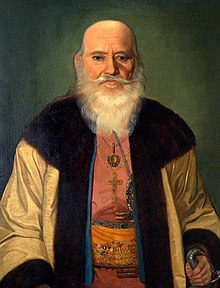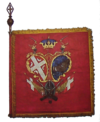Matija Nenadović: Difference between revisions
m Moving Category:Prime Ministers of Serbia to Category:Prime ministers of Serbia per Wikipedia:Categories for discussion/Speedy |
|||
| (36 intermediate revisions by 23 users not shown) | |||
| Line 1: | Line 1: | ||
{{Use dmy dates|date= |
{{Use dmy dates|date=October 2022}} |
||
{{Infobox |
{{Infobox officeholder |
||
|name = |
| name = Matija Nenadović |
||
| |
| native_name = Матија Ненадовић |
||
| native_name_lang = sr |
|||
|office = 1st [[Prime Minister of Serbia]] |
|||
| image = Portrait of Prota Mateja Nenadović (Uroš Knežević, 1852).jpg |
|||
|term_start = 27 August 1805 |
|||
| |
| office = [[Prime Minister of Serbia]] |
||
| |
| term_start = 27 August 1805 |
||
| |
| term_end = April 1807 |
||
| |
| monarch = [[Karađorđe]] |
||
| |
| predecessor = ''Position established'' |
||
| successor = [[Mladen Milovanović]] |
|||
|term_start2 = |
|||
| ⚫ | |||
|term_end2 = |
|||
| ⚫ | |||
|predecessor2 = |
|||
| ⚫ | |||
|successor2 = |
|||
| ⚫ | |||
| ⚫ | |||
| party = [[Independent politician|Independent]] |
|||
| ⚫ | |||
| ⚫ | |||
| ⚫ | |||
|awards = [[Order of Glory (Ottoman Empire)|Order of Glory]] |
|||
| ⚫ | |||
|nationality = [[Serbs|Serbian]] |
|||
|religion = [[Serbian Orthodox]] |
|||
|party = |
|||
| ⚫ | |||
}} |
}} |
||
'''Matija''' or '''Mateja Nenadović''' |
'''Matija Nenadović''' ({{lang-sr-cyrl|Матија Ненадовић}}, or '''Mateja Nenadović''' {{lang-sr-cyr|Матеја Ненадовић}}; 26 February 1777 – 11 December 1854), also known as '''Prota Mateja''', was a Serbian archpriest, writer, and politician who served as the first [[Prime Minister of Serbia|prime minister of Serbia]] from 1805 to 1807. He was a notable leader in the [[First Serbian Uprising]]. |
||
==Life== |
==Life== |
||
[[File:Valjevo, Spomenik Proti Mateji Nenadoviću, 03.JPG|thumb|Matija Nenadović's monument in [[Valjevo]]|left]] |
|||
At the age of sixteen he was ordained priest, and a few years later was promoted to an archpriest ({{lang-sr| |
At the age of sixteen he was ordained priest, and a few years later was promoted to an archpriest ({{lang-sr|Протојереј}}), colloquially ''prota'' ({{lang-sr|прота}}) of [[Valjevo]]. His father, [[Aleksa Nenadović]], [[Knez (title)|Knez]] (chief magistrate) of the district of Valjevo, was one of the most popular and respected public men among the Serbs at the beginning of the 19th century. When the four leaders of the [[Janissary|Janissaries]] of the [[Sanjak of Smederevo]] (the so-called [[Janissary|Dahia]]s) thought that the only way to prevent a general rising of the Serbs was to intimidate them by [[Slaughter of the knezes|murdering all their principal men]], Aleksa Nenadović (1749–1804) was one of the first victims. The policy of the Dahias, instead of preventing, did actually and immediately provoke a general insurrection of the Serbs against the [[Ottoman Turks|Turks]]. |
||
Prota Mateja became the deputy-commander of the insurgents of the Valjevo district (1804), but did not hold the post for long, as [[Karađorđe]] sent him in 1805 on a secret mission to [[St. Petersburg]], and afterwards employed him almost constantly as Serbia's diplomatic envoy to Russia, Austria, [[Bucharest]] and [[Constantinople]]. After the fall of Karadjordje (1813), the new leader of the Serbs, [[Miloš Obrenović]], sent Prota Mateja as representative of Serbia to the [[Congress of Vienna]] (1814–1815), where he pleaded the Serbian cause indefatigably. During that mission he often saw [[Lord Castlereagh]], and for the first time the Serbian national interests were brought to the knowledge of British statesmen. |
Prota Mateja became the deputy-commander of the insurgents of the Valjevo district (1804), but did not hold the post for long, as [[Karađorđe]] sent him in 1805 on a secret mission to [[St. Petersburg]], and afterwards employed him almost constantly as Serbia's diplomatic envoy to Russia, Austria, [[Bucharest]] and [[Constantinople]]. After the fall of Karadjordje (1813), the new leader of the Serbs, [[Miloš Obrenović]], sent Prota Mateja as representative of Serbia to the [[Congress of Vienna]] (1814–1815), where he pleaded the Serbian cause indefatigably. During that mission he often saw [[Lord Castlereagh]], and for the first time the Serbian national interests were brought to the knowledge of British statesmen. |
||
Prota Mateja's memoirs (''Memoari Prote Mateje Nenadovića'') are the most valuable authority for the history of the first and [[Second Serbian uprising]] against the Turks. |
Prota Mateja's memoirs (''Memoari Prote Mateje Nenadovića'') are the most valuable authority for the history of the first and [[Second Serbian uprising]] against the Turks. |
||
He had a brother, [[Sima Nenadović|Sima]], a ''voivode''. His paternal uncle, [[Jakov Nenadović]], had an equally important role in Serbia, as the first Interior Minister. Mateja Nenadović had a son, [[Ljubomir Nenadović]]. |
|||
He had a brother, [[Sima Nenadović|Sima]], a ''voivode''. His paternal uncle, [[Jakov Nenadović]], had an equally important role in Serbia, as the first Interior Minister. Mateja Nenadović had a son, [[Ljubomir Nenadović]], born on 14 September 1826 at Brankovina, near [[Valjevo]]. From his earliest years he showed uncommon diligence and perseverance in classical studies, nothwithstanding many difficulties and privations. In 1844 he went to Prague, Berlin and Heidelberg where he studied at their universities. His reputation as a literary scholar, writer and poet secured him a post of professor at the [[Belgrade Lyceum]]. In 1851 Ljubomir Nenadović accompanied [[Petar II Petrović Njegoš]] on his last voyage in Italy. His ''Letters from Italy'' reveal many intimate sides of Njegoš's personality. Nenadović was only 25 years old at the time. When Njegoš, the great Serb poet, was dying Ljubomir Nenadović arrived in Cetinje to record whatever he could from the eyewitnesses and to save it for posterity. In later life Ljubomir Nenadović took an active part in politics; he became a secretary at a Serbian Legation in Constantinople; and in 1859 he was in charge of the Press Bureau of the Serbian Foreign Office. |
|||
Nenadović was a [[Freemasonry|Freemason]].<ref>{{Cite web |title=Početna |url=https://vmls.org.rs/ |access-date=2023-04-07 |website=Velika Masonska Loža Srbije |language=sr}}</ref> |
|||
==Works== |
==Works== |
||
He is best known for his |
He is best known for his work ''The Memoirs of Prota Nenadović''. He also authored other memoirs and documentary literature. |
||
==Legacy== |
==Legacy== |
||
He is included in [[The 100 most prominent Serbs]]. |
He is included in the book ''[[The 100 most prominent Serbs]]''. |
||
== |
==See also== |
||
* [[List of Serbian Revolutionaries]] |
|||
== References == |
|||
{{Reflist}} |
{{Reflist}} |
||
* Translated from Serbian Wikipedia: https://sr.chped.com/wiki/%D0%9F%D1%80%D0%BE%D1%82%D0%B0_%D0%9C%D0%B0%D1%82%D0%B8%D1%98%D0%B0_%D0%9D%D0%B5%D0%BD%D0%B0%D0%B4%D0%BE%D0%B2%D0%B8%D1%9B |
|||
==Sources== |
==Sources== |
||
* {{cite book|last=Milićević|first=Milan| |
* {{cite book|last=Milićević|first=Milan|author-link=Milan Milićević|year=1888|title=Поменик знаменитих људи у српскога народа новијега доба|publisher=Srpska kraljevska štamparija|url=https://archive.org/stream/pomenikznameniti00miliuoft|pages=408–412 |
||
}} {{PD-icon}} |
|||
*{{EB1911|wstitle=Nenadovich, Mateya|volume=19|page=371}} |
|||
*{{EB1911}} |
|||
*{{cite web|author=Srpska književna zadruga|title=Memoari Prote Matije Nenadovića|work=Srpska književna zadruga 9|year=1893|url=https://archive.org/stream/memoari00nenad}} |
*{{cite web|author=Srpska književna zadruga|title=Memoari Prote Matije Nenadovića|work=Srpska književna zadruga 9|year=1893|url=https://archive.org/stream/memoari00nenad}} |
||
{{s-start}} |
{{s-start}} |
||
{{s-off}} |
{{s-off}} |
||
{{s-new| |
{{s-new|Post established|reason=Serbian revolution}} |
||
{{s-ttl|title=[[Prime Minister of Serbia]]|years=27 Aug 1805 – Jan 1807}} |
{{s-ttl|title=[[Prime Minister of Serbia]]|years=27 Aug 1805 – Jan 1807}} |
||
{{s-aft|after=[[Mladen Milovanović]]}} |
{{s-aft|after=[[Mladen Milovanović]]}} |
||
| Line 59: | Line 60: | ||
{{SerbianPM}} |
{{SerbianPM}} |
||
{{Serbian revolutionaries}} |
{{Serbian revolutionaries}} |
||
{{Serbian literature}} |
|||
{{Authority control}} |
{{Authority control}} |
||
{{DEFAULTSORT:Nenadovic, Mateja}} |
{{DEFAULTSORT:Nenadovic, Mateja}} |
||
[[Category:People of the First Serbian Uprising]] |
[[Category:People of the First Serbian Uprising]] |
||
[[Category:Prime |
[[Category:Prime ministers of Serbia]] |
||
[[Category:19th-century Serbian |
[[Category:19th-century Serbian historians]] |
||
[[Category:Serbian writers]] |
[[Category:Serbian male writers]] |
||
| ⚫ | |||
[[Category:Serbian Orthodox clergy]] |
[[Category:Serbian Orthodox clergy]] |
||
[[Category:Nenadović family|Mateja]] |
[[Category:Nenadović family|Mateja]] |
||
[[Category: |
[[Category:Writers from Valjevo]] |
||
[[Category:1777 births]] |
[[Category:1777 births]] |
||
[[Category:1854 deaths]] |
[[Category:1854 deaths]] |
||
[[Category:Ambassadors to the Russian Empire]] |
[[Category:Ambassadors to the Russian Empire]] |
||
[[Category:Armed priests]] |
[[Category:Armed priests]] |
||
[[Category:Politicians from Valjevo]] |
|||
[[Category:Clergy from Valjevo]] |
|||
| ⚫ | |||
Latest revision as of 23:11, 3 May 2024
Matija Nenadović | |
|---|---|
Матија Ненадовић | |
 | |
| Prime Minister of Serbia | |
| In office 27 August 1805 – April 1807 | |
| Monarch | Karađorđe |
| Preceded by | Position established |
| Succeeded by | Mladen Milovanović |
| Personal details | |
| Born | 26 February 1777 Brankovina, Ottoman Empire (present-day Serbia) |
| Died | 11 December 1854 (aged 77) Valjevo, Principality of Serbia |
| Political party | Independent |
| Awards | Order of Glory |
| Signature | |
Matija Nenadović (Serbian Cyrillic: Матија Ненадовић, or Mateja Nenadović Serbian Cyrillic: Матеја Ненадовић; 26 February 1777 – 11 December 1854), also known as Prota Mateja, was a Serbian archpriest, writer, and politician who served as the first prime minister of Serbia from 1805 to 1807. He was a notable leader in the First Serbian Uprising.
Life[edit]

At the age of sixteen he was ordained priest, and a few years later was promoted to an archpriest (Serbian: Протојереј), colloquially prota (Serbian: прота) of Valjevo. His father, Aleksa Nenadović, Knez (chief magistrate) of the district of Valjevo, was one of the most popular and respected public men among the Serbs at the beginning of the 19th century. When the four leaders of the Janissaries of the Sanjak of Smederevo (the so-called Dahias) thought that the only way to prevent a general rising of the Serbs was to intimidate them by murdering all their principal men, Aleksa Nenadović (1749–1804) was one of the first victims. The policy of the Dahias, instead of preventing, did actually and immediately provoke a general insurrection of the Serbs against the Turks.
Prota Mateja became the deputy-commander of the insurgents of the Valjevo district (1804), but did not hold the post for long, as Karađorđe sent him in 1805 on a secret mission to St. Petersburg, and afterwards employed him almost constantly as Serbia's diplomatic envoy to Russia, Austria, Bucharest and Constantinople. After the fall of Karadjordje (1813), the new leader of the Serbs, Miloš Obrenović, sent Prota Mateja as representative of Serbia to the Congress of Vienna (1814–1815), where he pleaded the Serbian cause indefatigably. During that mission he often saw Lord Castlereagh, and for the first time the Serbian national interests were brought to the knowledge of British statesmen. Prota Mateja's memoirs (Memoari Prote Mateje Nenadovića) are the most valuable authority for the history of the first and Second Serbian uprising against the Turks.
He had a brother, Sima, a voivode. His paternal uncle, Jakov Nenadović, had an equally important role in Serbia, as the first Interior Minister. Mateja Nenadović had a son, Ljubomir Nenadović.
Works[edit]
He is best known for his work The Memoirs of Prota Nenadović. He also authored other memoirs and documentary literature.
Legacy[edit]
He is included in the book The 100 most prominent Serbs.
See also[edit]
References[edit]
Sources[edit]
- Milićević, Milan (1888). Поменик знаменитих људи у српскога народа новијега доба. Srpska kraljevska štamparija. pp. 408–412. (
 Public domain)
Public domain) - This article incorporates text from a publication now in the public domain: Chisholm, Hugh, ed. (1911). "Nenadovich, Mateya". Encyclopædia Britannica. Vol. 19 (11th ed.). Cambridge University Press. p. 371.
- Srpska književna zadruga (1893). "Memoari Prote Matije Nenadovića". Srpska književna zadruga 9.
- People of the First Serbian Uprising
- Prime ministers of Serbia
- 19th-century Serbian historians
- Serbian male writers
- Serbian Orthodox clergy
- Nenadović family
- Writers from Valjevo
- 1777 births
- 1854 deaths
- Ambassadors to the Russian Empire
- Armed priests
- Politicians from Valjevo
- Clergy from Valjevo
- Serbian Freemasons


